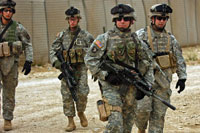US Prepares for Aggression, Russia Could Be One of the Targets
The US military is to pay extra $500 to all officers and soldiers (in addition to translators and intelligence officers) who know at least one foreign language, especially Russian and Chechen. Those who know two foreign languages will be paid $1000 extra, and so on.

The decision was made by the US Department of Defense. They concluded that implementation of various missions abroad largely depends on the ability of soldiers to communicate in the language of the inhabitants of the country where the operation is conducted. “We are talking about the human aspect of the mission. To be successful, it is important to understand the customs and culture of these people and speak their language,” said Lt. Col. Paul Valenzuela, responsible for implementing the program of language training and regional studies at the Air Force.
According to the lieutenant colonel, approximately 4.3 thousand military people currently receive the said language allowance. Interestingly enough, Russian falls into the category of "urgently needed". Pravda.ru talked to three experts to find out why.
“Choice of a language to be mastered by the US military says a lot,” says Dmitry Rogozin, permanent representative of Russia to NATO. “This allows predicting areas where Washington may become active. If we look at the list of languages recommended for American military pilots, we will see that in addition to Russian and Chechen it includes the languages of other peoples residing in the Caucasus, such as Azerbaidzhan, Armenian, and Georgian. This means that in the near future the US may pay particular attention to the Caucasus region. However, I do not see a possibility of a serious conflict between Russian and the Block NATO. This is not because the alliance is particularly friendly towards Russia; this is because while we have modern nuclear weapons, they will not bother us. Yet, it is possible that they will try to drag us into conflicts through third parties, like it happened in August of 2008. Then someone pushed Saakashvili to get aggressive towards South Ossetia.”
Konstantin Sivkov, the first vice president of the Academy for Geopolitical Issues, thinks that is worth remembering that not long before the aggression towards Iraq and Yugoslavia, American officers began studying the Arabic and Serbian languages. “Now, the US is preparing for aggression that would not happen tomorrow, but this preparation is under way. The increase in the allowance for American officers should be considered as one of the elements of this preparation. First of all, it is directly connected to American military training that recently took place in the Baltic states. During the training, the Pentagon practiced transitioning of large military troops from the US and Western Europe to the Baltic states.
Second, it has to do with the deployment of the missile defense system in Bulgaria, Poland and Romania. As for the urgent need in the Russian and Caucasus languages, most likely, the American leaders intend to use the Caucasus again to organize military interference. This could be a conflict on the territory of Russian North-Caucasus republics or another attempt of Georgia to fight against South Ossetia and Abkhazia. Russia will be blamed in all things possible. The US will demand that Russia stops its operation targeted at preserving its national interest in the region. It is not ruled out that the US would require bringing its troops to the “problem territory,” the expert suggested.
Alexander Khramchikhin, deputy director of the Institute for Political and Military Analysis, does not see any threats to Russia’s interests in the Pentagon’s initiative. “American officers traditionally learn foreign languages. They always suffered from the lack of foreign language education. For a long time it was considered that foreign languages are not required because everyone spoke English. Obviously, it was a gross exaggeration. The intention of the Americans to learn foreign languages is another proof of their global ambitions. Conflicts can arise anywhere, which is why the list of recommended languages includes 100 languages in addition to Russian and Chechen.
Evidently, the list includes many languages of the peoples of the Caucasus. This is not surprising. All countries there have conflicts of various levels of intensity.
Khramchikhin rules out a threat of a conflict between Russia and NATO: “European countries do not want conflicts. In the future, much will depend on our behavior. If we act like we used to during cold war and bother NATO for no reason while reducing our own armed forces without strengthening their potential, such conflict may become a reality,” the expert believes.
Sergey Balmasov
Pravda.Ru
Russia Today: NATO Encouraged Georgia
Subscribe to Pravda.Ru Telegram channel, Facebook, RSS!





